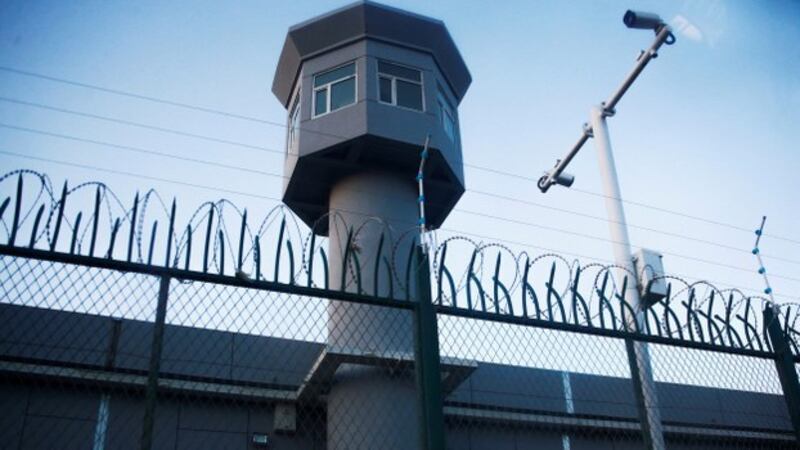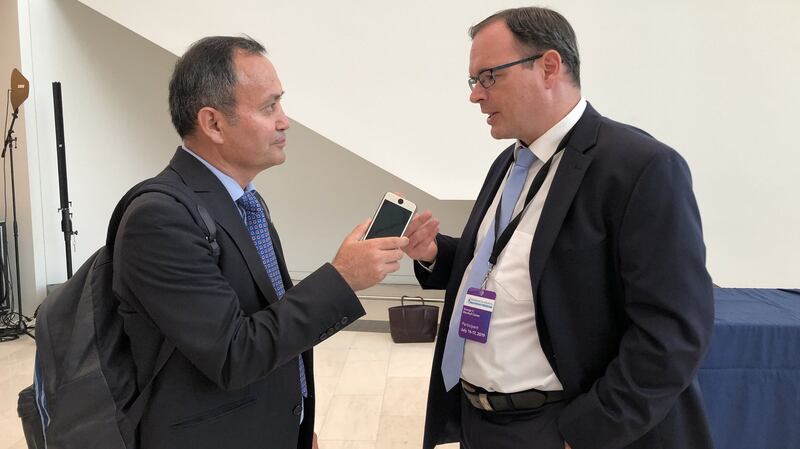China on Monday labeled as “lies” a U.S. designation of abuses in the Xinjiang Uyghur Autonomous Region (XUAR) as genocide in a report that cites residents it said had flocked to social media to “refute” the claim, but an expert said it would do little to address growing concerns over the situation there.
On Jan. 19—his last full day as top U.S. diplomat—former Secretary of State Mike Pompeo said Chinese policies in the XUAR aim for “the forced assimilation and eventual erasure of a vulnerable ethnic and religious minority group” as he announced a designation that Uyghur exile groups have advocated since the revelation in 2017 of mass internment camps that have held as many as 1.8 million Uyghurs and other Muslim minorities.
Pompeo said he had “determined” China is “committing genocide and crimes against humanity” in the XUAR against Uyghurs and other ethnic groups, and that Beijing and the ruling Chinese Communist Party (CCP) “must be held to account.”
The new Secretary of State, Antony Blinken, has endorsed the designation, suggesting that President Joe Biden's administration will pursue a more forceful approach in holding China accountable for its abuses in the region. Emily Horne, the spokesperson for Biden's National Security Council, told the Washington Examiner over the weekend that "President Biden has called the oppression of the Uyghurs a genocide, and he stands against it in the strongest possible terms."
On Jan. 20, the first day of the Biden administration, Chinese Foreign Ministry spokesperson Hua Chunying slammed Pompeo’s “venomous lies” and called the determination “nothing more than a piece of wastepaper.”
“This notorious liar and cheater is making himself a doomed clown and a joke of the century with his show of lies and madness just before the curtain falls,” she told reporters at a regularly scheduled press briefing in Beijing.
On Monday, the official Global Times newspaper ran an unsigned report which said that since the announcement "many residents from Xinjiang began to post videos of themselves telling stories of their own lives to refute Pompeo's 'genocide' claim" with the hashtag 'This is Xinjiang' on the Sina Weibo social media platform. It said that at the time of publishing, the topic had been viewed nearly 47 million times and commented on by more than 53,000 netizens.
The report, which was accompanied by a video of Uyghurs using the Uyghur language and Mandarin Chinese to discuss how the CCP had improved their lives in the region, quoted four Uyghurs praising the government and telling Washington to butt out of China’s affairs.
“Pompeo is a liar. What he said is opposite to what I see with my own eyes every day,” the report cited Alinur, a “grassroots civil servant,” as saying.
“As a Uyghur living in Xinjiang, I have more rights to say whether it is good than a U.S. politician,” said the resident of Ghulja (in Chinese, Yining)—the seat of Ili Kazakh (Yili Hasake) Autonomous Prefecture and the XUAR’s third largest city.
The report also said that in recent days authorities in China and the XUAR have “expressed strong opposition” to Pompeo’s designation. It cited a statement released by the Standing Committee of Xinjiang Regional People's Congress on Sunday, which said that Pompeo’s “slander severely violated international laws and hurt the feelings of all ethnic groups in Xinjiang.”
The regional legislature trumpeted achievements in “poverty alleviation, anti-terrorism, employment and improving local residents’ living standards in recent years,” and said members of the international community who have been invited to the XUAR “have applauded Xinjiang's improvements in protecting human rights.”
The report quoted “Chinese analysts” as saying that countries “should be cautious” about following Pompeo’s lead “as it would jeopardize bilateral ties,” noting that Canadian Conservatives on Sunday called on the federal government to also label Beijing’s policies in the region as “genocide” and “crimes against humanity.”

Sweet-talking Washington
German researcher Adrian Zenz, a leading expert on China’s policies toward Uyghurs whose research provided critical evidence of abusive policies in the XUAR, told RFA’s Uyghur Service on Monday that China is trying to promote a counternarrative both internationally and domestically about the Uyghurs. And while that narrative may be largely successful on the nation’s majority Han Chinese, “there's a good chance that the Uyghurs will interpret this in light of their entire and past experience with the regime and its propaganda and might come to opposite conclusions.”
Reports suggest that amid increasing international scrutiny, authorities in the XUAR have begun to send detainees to work at factories as part of an effort to label the camps “vocational centers,” although those held in the facilities regularly toil under forced or coerced labor conditions.
Former President Donald Trump’s administration in July leveled sanctions against several top Chinese officials deemed responsible for rights violations in the region, including regional party secretary Chen Quanguo, under the Global Magnitsky Human Rights Accountability Act.
The move, which marked the first time Washington had sanctioned a member of China’s powerful Politburo, followed Trump’s enactment in June of the Uyghur Human Rights Policy Act of 2020 (UHRPA), which passed nearly unanimously through both houses of Congress at the end of May. The legislation highlights arbitrary incarceration, forced labor, and other abuses in the XUAR and provides for sanctions against the Chinese officials who enforce them.
The Biden administration has yet to lay out its foreign policy approach to China and Zenz, a senior fellow at the Washington-based Victims of Communism Memorial Foundation, said Beijing may be trying to test the waters with state media reports such as the one published Monday.
“I think they're now being very careful because of the new Biden administration and I think there is some hope on the side of the Chinese that they can sweet talk the Biden administration into being more compromising—taking a more compromising or lenient stance on China which, from what I gather, is unlikely … at least on Xinjiang and human rights,” he said.
“China is obviously hoping to sweet talk them and is trying to sort of blame individuals like Pompeo. It is always easy to blame individuals for a wider problem.”

Targeting individuals
In June, Zenz published a report documenting a dramatic increase in recent years in the number of forced sterilizations and abortions targeting Uyghurs in the XUAR. The report concludes that such measures may amount to a government-led campaign of genocide under United Nations definitions.
China did not make a spokesperson available for comment on this report, but when Zenz’s study on forced birth control came out in June, official media vilified him and said Beijing is ‘considering suing’ him for libel, while the foreign ministry denounced him.
Zenz said he is “very used to” being vilified in China these days for speaking out about rights violations in the XUAR and elsewhere in the country.
“It's become very normal for the Chinese foreign ministry to attack me by name, which kind of shows their desperation,” he said.
“They're quite desperate, quite on the defensive, because there's been so much evidence on the terrible atrocities they're committing, and so that seems to be their solution to try to attack and discredit individuals.”
He said Chinese propaganda has a certain value in that “there are always going to be people who are going to read between the lines.”
“Anybody with any experience knows that they often say the very opposite of what is true, and so there might be some benefit in their propaganda falsehoods, as long as people know how to interpret it,” he said.
Zenz acknowledged that such reports by state media give nations that benefit from Chinese investment the ability to appoint their version of the truth, saying that Beijing is denying rights abuses in the XUAR and that there isn’t enough evidence, and thus construct an alternative narrative.
But he warned China against becoming too overconfident about its ability to continue its policies of repression there without being held to account.
“I think the Chinese at this point just trust that they're not going to pay a heavy price for the atrocities and in that sense, maybe they think it doesn't matter ... [They say] ‘We can do whatever we want to and internationally there’s enough countries who are at least quiet or are on our side,’” Zenz said.
“They might feel just confident about this, but people who are very confident also tend to make mistakes, so this could be very interesting.”
Reported by Nuriman Abdurashit for RFA’s Uyghur Service. Written in English by Joshua Lipes.
